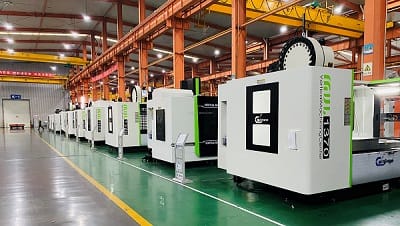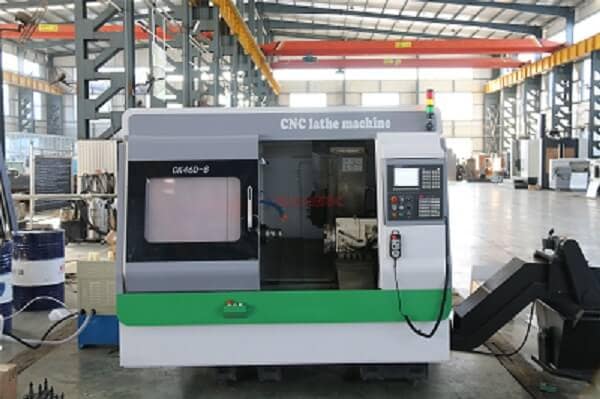CNC (Computer Numerical Control) milling machines have revolutionized the manufacturing industry, making complex machining processes faster, more accurate, and cost-effective. These machines are the backbone of precision manufacturing, and their integration into modern production environments has significantly enhanced product quality and operational efficiency. In this article, we will explore the CNC milling machine and its modern advantages, highlighting why it has become an indispensable tool in today’s manufacturing landscape.
What is a CNC Milling Machine?
Before diving into its advantages, it’s important to understand what a CNC milling machine is. A CNC milling machine uses a computer-controlled program to operate its cutting tools and perform precise, multi-axis movements to shape and cut materials such as metal, plastic, and composites. Unlike traditional milling machines, which require manual operation, a CNC milling machine can automatically control the movement of its cutting tools, allowing for a higher degree of accuracy, repeatability, and speed.
These machines are utilized in various industries, including aerospace, automotive, medical device manufacturing, and electronics. With advancements in technology, CNC milling machines have evolved into highly versatile machines capable of performing a wide range of tasks, from drilling and boring to contouring and engraving.
The Unmatched Precision and Accuracy of CNC Milling Machines
One of the most significant advantages of a CNC milling machine is its precision. Traditional milling machines rely on human skill, which introduces the potential for errors due to fatigue, inexperience, or miscalculation. In contrast, a CNC milling machine operates based on exact instructions programmed into its system, minimizing the chances of human error and ensuring every cut is made to exact specifications.
This precision is crucial in industries that require high-tolerance parts, such as the aerospace and medical sectors, where even the smallest deviation in measurements could lead to catastrophic failures. CNC milling machines can produce components with tolerances as tight as ±0.002mm, far surpassing what is achievable with manual machines.
효율성 및 생산성 향상
Another notable advantage of CNC milling machines is their ability to operate continuously, 24/7, with minimal downtime. This automation significantly boosts productivity compared to manual machines, which require constant monitoring, setup, and adjustments. Once a program is set up, a CNC milling machine can run multiple parts simultaneously, reducing lead times and increasing throughput.
Moreover, modern CNC milling machines often feature advanced automation options such as robotic arms, pallet changers, and tool changers, allowing for even more efficient and automated production cycles. The result is faster delivery times and reduced labor costs, making it easier for manufacturers to meet tight production schedules.

Flexibility and Versatility in Manufacturing
The versatility of a CNC milling machine is another reason for its widespread use across industries. These machines are capable of handling a variety of materials, including metals, plastics, wood, and composites, making them highly adaptable to different manufacturing needs. Whether it’s machining a small, intricate part for the medical industry or creating a large, heavy-duty component for the automotive sector, a CNC milling machine can be configured to handle the job with precision and efficiency.
Furthermore, CNC milling machines can perform multiple functions, such as drilling, tapping, and boring, all in one machine. This eliminates the need for multiple machines, simplifying the manufacturing process and reducing space and resource requirements.
Cost-Effectiveness and Reduced Waste
While the initial investment in a CNC milling machine can be significant, the long-term benefits far outweigh the costs. One of the key ways CNC milling machines save money is by reducing material waste. Because these machines are highly precise, they can cut materials with minimal waste, which is crucial in industries that deal with expensive raw materials.
Additionally, the automation of the milling process reduces the need for skilled labor, which can be expensive and difficult to find. By using a CNC milling machine, manufacturers can reduce labor costs and allocate resources more effectively. Over time, the machine’s high efficiency and reduced waste lead to significant cost savings.
Enhancing Innovation and Product Development
In today’s competitive market, innovation is key to staying ahead. CNC milling machines play a critical role in product development by enabling rapid prototyping. Designers and engineers can quickly produce prototypes, test their designs, and make necessary adjustments before moving to mass production. This shortens product development cycles, allowing companies to bring new products to market faster.
The high precision of CNC milling machines also enables the production of complex shapes and intricate designs that may not be possible with traditional methods. This fosters creativity and innovation, empowering engineers to push the boundaries of product design.
The Sustainability of CNC Milling Machines
In the current global economy, sustainability is a growing concern for both consumers and manufacturers. CNC milling machines contribute to sustainability efforts by minimizing material waste and reducing energy consumption. Because these machines are highly efficient and produce parts with minimal waste, they contribute to a more sustainable manufacturing process.
Additionally, the automation provided by CNC milling machines reduces the need for excessive transportation and handling of materials, further decreasing the carbon footprint associated with production.
Why CNC Milling Machines Are the Future of Manufacturing
The CNC milling machine is undoubtedly one of the most influential innovations in modern manufacturing. From precision and efficiency to versatility and cost-effectiveness, the advantages it offers are numerous and undeniable. Here are the key reasons why CNC milling machines are an essential tool for manufacturers:
Unmatched precision and accuracy: CNC milling machines are capable of producing high-tolerance parts that meet strict specifications, ensuring quality and safety.
Increased productivity: With automation, CNC milling machines can operate continuously, reducing lead times and increasing output.
Versatility and flexibility: These machines can handle a wide range of materials and processes, making them adaptable to diverse industries.
Cost savings: By reducing material waste and labor costs, CNC milling machines offer a high return on investment.
Support for innovation: CNC milling machines enable rapid prototyping and the production of complex designs, fostering innovation.
Sustainability: The efficient use of materials and energy makes CNC milling machines a more environmentally friendly option compared to traditional methods.
결론
In conclusion, the CNC milling machine represents a powerful tool in the modern manufacturing industry. It brings together precision, efficiency, versatility, and cost-effectiveness, making it an indispensable asset for companies looking to stay competitive. As technology continues to evolve, CNC milling machines will likely play an even more significant role in shaping the future of manufacturing. Whether you are looking to increase productivity, reduce costs, or drive innovation, investing in a CNC milling machine is a smart decision that will pay off in the long run.
